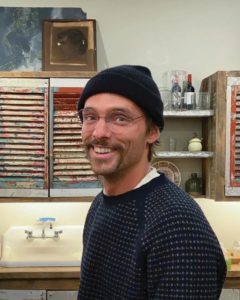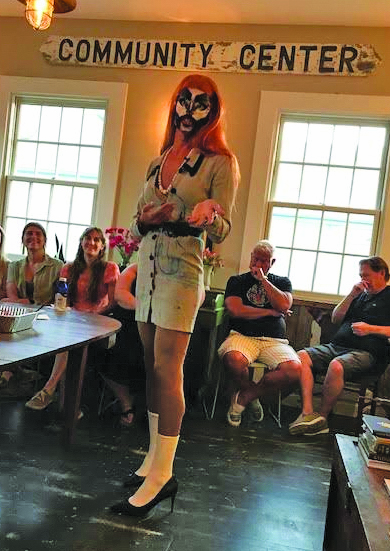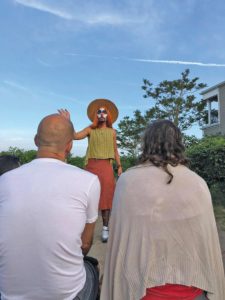Eggs Isle is a fictional place off the coast of Provincetown where those who are evicted from their homes wash ashore. It is also the name of a live improvisational comedy podcast hosted by Cody Sullivan and his “godmother,” Saltine, who may or may not be the same person.

According to its website, the podcast tells “the stories of the people too ugly or poor to live in Provincetown.” Either Sullivan or Saltine — never both at the same time — hosts the recording every Tuesday at 8 p.m. in the kitchen of the Provincetown Commons, a cozy, wood-paneled room hung with oil paintings of dunes and sailboats in their berths. The episodes are aired on WOMR every first and third Thursday of the month at 8:30 p.m.
The show made on Oct. 25 was the last recording of the month, and perhaps of the season. The audience gathered around Sullivan, who was perched on the couch with a small microphone clipped to his plaid shirt.
“This is not a performance,” he began. “This is a happening, an experience.”
Sullivan relies on crowd participation to inspire the material in each episode. “I want you to be vocal,” he told the audience. “I want you to dig your hands into the carcass of this show.”
From there, the rest was made up.
Every episode of the podcast chronicles a specific event or introduces a figure on Eggs Isle, the land where “all of the poor oddballs end up, along with your favorite restaurants and stores that succumbed to rising rents,” said Saltine, the de facto leader of the isle, in one of the podcast’s earlier episodes. (Sullivan says that, before landing on Eggs Isle, Saltine was an “internationally renowned art historian, biographer, and former financial adviser to the Ford administration.”)

Past episodes include the story of a bell ringer in Provincetown who was fired after the bells were automated and a pageant where the categories included the ugliest person and the person with the least talent. (Both contests were won by Saltine.)
Sullivan said that his inspiration for the podcast came from “a place of resentment of seeing gentrification” sweep across Provincetown. He said the historic houses that were demolished to build condos in Provincetown were sent to Eggs Isle, where residents can choose to live where they please.
“Everyone gets their due,” Sullivan said about Eggs Isle. “You get the opportunity to live your Provincetown dreams.” The only requirement for living there, he said, is that you were previously forced out of your Provincetown home.
Sullivan is no stranger to improvisational comedy. Before moving to Provincetown he studied at ImprovBoston in Cambridge and performed at the iO Theater in Chicago, where he lived for three years.
The pandemic hit a few months after Sullivan moved to Provincetown, and he found it harder to perform live. After a year of creative doldrums, Sullivan hosted Eggs Isle every week at the Julie Heller Gallery from spring through fall 2021.
The podcast has evolved over the past year and a half. The biggest change is that Sullivan recently stepped in as host, the role previously filled by Saltine. “She was like, ‘I am not being paid — you are going to do it,” said Sullivan.

Sullivan said the podcast has changed the way he approaches comedy. “It’s not about wanting to be famous anymore,” he said. Now, he hopes his comedy can create a space for communal release. “Humor has helped me so much when I am feeling gross,” he said. “Giving people an affordable space where you can laugh and be around other people is so important.”
As winter approaches, Sullivan said he is thinking about taking a hiatus from the weekly performance. In the spring, however, he predicts the podcast will be returning and will be bigger than ever, with live musicians and artists creating work to accompany the improvisation. “We are coming in hot,” he said.
As for Eggs Isle, the small island community will persevere through time and rising sea levels. “Eggs Isle is actually over an underground volcano, so it is constantly rising as the lava comes up,” Sullivan said. “It’s growing to accommodate more people who have been exiled because of climate change.”



